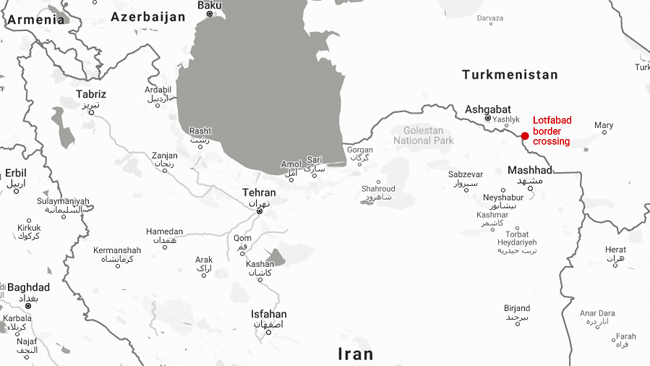Iran and Turkmenistan have allowed limited transshipment of goods through a major border crossing nine months after it was closed because of movement restrictions imposed to curb the spread of the coronavirus pandemic.
Lotfabad border crossing began to accommodate 10 truck cargoes per day through transshipment from Tuesday, the spokesman of Iran’s customs office (IRICA) said
Rouhollah Latifi said the border crossing reopens at the request of the government of Turkmenistan.
Iranian exporters and businesses use four border crossings to Turkmenistan for the transport of cargoes to the country and other landlocked states in the Central Asia region.

The maps shows the location of Lotfabad crossing at Iran-Turkmenistan border
Transport through two border crossings at Sarakhs and Incheboroun has already resumed and Iranian and Turkmen authorities mull reopening the fourth crossing at Bajgiran.
A major bridge linking the namesake cities of Sarakhs on the Iranian and Turkmen side of the border came on line in June to help increase Iranian exports to Central Asia.
Iran has also installed roll-on/roll-off facilities at Amir Abad port on the Caspian Sea to raise the volume of exports to the region through Ro-Ro shipping to Kazakhstan’s port of Kuryk.
Iran’s growing exports of goods to neighboring and nearby countries came to a halt this year following the spread of the coronavirus.
Borders came to a near-total closure in late May when government figures showed that movement of goods and passengers had plummeted to only three percent of the normal capacity at major crossings.
Iranian authorities hope reopening of the borders while observing strict hygiene protocols could help boost trade at a time the country is increasingly relying on non-oil exports as a major source of earning hard currency.